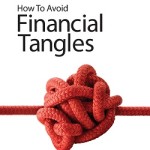If you ever read any novels by Jane Austen, Anthony Trollope, or Charles Dickens you quickly realize that the most important goal of 19th Century English life was securing – through a fortunate birth or a strategic marriage – a steady income based on the rents of private property.
The plots of all their novels hinge on this uncertain quest. All of their protagonists seek to navigate the twists and turns of what may euphemistically be termed ‘financial tangles.’
Popular culture – at least in the US – no longer focuses quite so much on this singular struggle, as our movies tend to teach either one of two lessons. It’s either ‘true love overcomes all obstacles’ or ‘underdogs can overcome powerful antagonists through pluck and an intriguing bromance.’[1]
Despite the shift in popular culture, however, I would argue that avoiding financial tangles remains the central struggle of real life in the 21 Century.
I mention this because I wandered into a used bookstore recently, found myself at the finance section, and a book named How To Avoid Financial Tanglesby The American Institute For Economic Research fell into my hands. [2]
Financial tangles? That sounded interesting, as did the fact that the AIER is in Great Barrington Massachusetts. Massachusetts! My people! This should be good, I thought.
I noticed the first edition of the book was published in 1938 (a good year for financial tangles) and has been updated periodically since then. I also noticed 1938 represents a sort of halfway point in time between the Dickens & Trollope era and our own day, although my copy from the bookstore was published in 1995.
I’ve been reading through it slowly since.
What many of us need to know about financial tangles goes beyond what can be gleaned for free from a finance blog. On the other hand, we do not want to start incurring lawyers’ and accountants’ fees whenever we might step into a tangle.
We often need something relatively sophisticated, but at the same time not overly technical.
This book offers a kind of half-way technical approach. You will not find clever Clint Eastwood references to explain insurance concepts, or clever Sci-Fi analogies for quantitative trading, but you will get a starter briefing on important issues of real estate, trusts, wills and estates, insurance and contracts – basically all of the stuff of 19th Century English novels.
Do you know the difference between joint tenancy and tenancy by the entirety? You better believe Lizzy Bennet knew. Are you familiar with Trusts for Minors? The lawyers in Jarndyce & Jarndyce were. Do you know the most important principles for designing a Will? The residents of Barsetshire did.
Do you have a will? Do you know why you should have one? Do you know why people – even relatively non-wealthy people – create trusts?
How To Avoid Financial Tangles can help you self-educate, most likely in advance of speaking with an attorney or some other specialist.
I’m not saying you will love reading this as much as you do reading Trollope, Dickens and Austen, but this is a solid place to start the modern process of avoiding financial tangles.
Please see post: All Bankers Anonymous reviews in one place!
[1] I defy you to come up with a major Hollywood movie that doesn’t follow one of these two patterns. See? You can’t do it.
[2] For those of you under age 40, “books” used to come in a paper, glue, ink, and cardboard format that could be physically held. This brought tremendous obvious disadvantages to people who read “books” this way. You couldn’t create an infinite number of copies at the press of a button. You could not Google search for key words, or check your precise % already read. You could not even cut and paste favorite passages to your Twitter account, without doing irreversible damage to the original book with scissors. Anyway, for this old style of book, believe it or not but there are still actual buildings where “physical book” fetishists still lurk, touching and handling the old-style paper and ink things. Used bookstores – and physical bookstores for that matter – now exist only outside of the “real economy” and may be safely ignored by all of you under age 40.
Post read (4876) times.








One Reply to “Book Review: How To Avoid Financial Tangles”
For those of you over 40… If you get confused about this novel thing called the “internet” (also known as “interwebs”, “worldwide web”, “AOL”, “online” and “MSN Homepage”), give me a shout. I’ll be sure to google the closest bookstore to help you stop embarrassing your kids (whether you realize it yet or not)